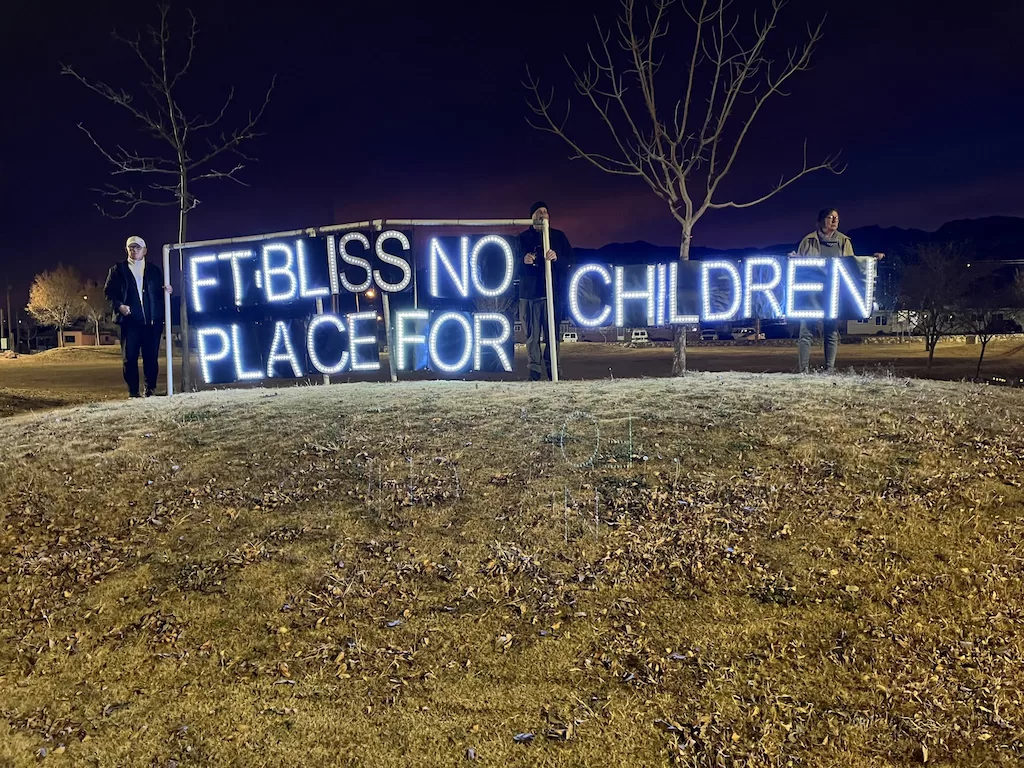
Editor’s note: During the recently completed Journey for Justice along the US-Mexico border, the People’s Tribune’s Bob Lee interviewed three of the participants in the journey – Valerie Carlisle, Vielka Wambold and Taylor Holbrook. Below are excerpts from their comments. The 2,200 mile Journey for Justice caravan traveled for two weeks in early December from Brownsville, Texas to San Ysidro, California to call attention to the injustices resulting from US immigration policy and to highlight the work of organizations along the border who are striving to help migrants and refugees. The journey, which included people from across the country, was sponsored by Witness at the Border in conjunction with more than 40 partner organizations, including the People’s Tribune and Tribuno del Pueblo.
Valerie Carlisle: I live near Poughkeepsie, New York, a little bit upstate from the city. I’m part of the Hudson Valley. And I’m a member of Grannies Respond. I’m actually on the board. And I am part of the steering committee of Reunite Migrant Families, which is our local group.
People’s Tribune: What prompted you to come on the Journey for Justice?
VC: Well, I was part of the original Grannies Respond caravan to McAllen, Texas, in 2018, where we were protesting the separation of children from their parents. And I found that to be very moving and very insightful to actually see things in person, as well as be around other activists that were like-minded in a time where the loudest voices were the ones that were full of hate, I’m afraid. So after that trip, I started going to different places. I didn’t go to Tornillo [Texas], but I went to El Paso for La Grita de Frontera, where I met Camilo and Josh [of Witness at the Border], and I went to Washington to lobby about children detention centers. And then I went to Homestead [Florida] several times for the children detention centers there. And each time I realized that seeing it, being there, witnessing it, just changes your life.
And, then I went down to Brownsville for witness at MPP [regarding the “remain in Mexico” policy], and again, just going into Matamoros [Mexico] and seeing the people, I could bring it back. I started to feel that I could tell other people. And especially with my friend Andrea, who had made a short documentary about Grannies Respond, we used that documentary as an entryway to churches and colleges and places where we could show the movie, then update people about what was currently happening. So when this Journey for Justice happened, not only did I want to see my old friends but I also just felt it was important to see more places along the border and feel them, you know, see them and feel them in my heart, to bring that information back.
Vielka Wambold: I currently live in Iowa, but I’m a recent transplant this year to Iowa. Before that I was six years in Florida.
PT: What prompted you to come on the Journey for Justice?
VW: I started following Witness at the Border when Josh was down at Tornillo, protesting or witnessing for the children in detention. And so I had just moved to Florida and was watching what was going on and got outraged, you know, and then I wanted to go to Tornillo, but couldn’t. And so then when they moved to Homestead [Florida], well that was basically in my backyard – three hours away driving. And my husband and I went down to one of their actions and we had ladders that we could see over the fence that they had tried to block off, to see the children at play when they were allowed out for recess. And I climbed that ladder and I tell people that it was really impacting because the girls were out at the time when I stood on those ladders.
And I looked across the fence and I couldn’t help but basically see me at that age. And that impacted me a lot. And since then, I joined up with them and was at Homestead most of the time, you know, in 2019. Back in Port Charlotte where I lived, I was president of a few groups – Democratic Hispanic Caucus, LULAC, things of that nature. I met people, including Grannies Respond, and so this [Journey for Justice] was a no-brainer for me to come to, you know, to start the action again and go over, across to Matamoros and update, and see what’s going on. And it hurts.
Taylor Holbrook: I’m from the Hudson Valley of New York, a town called Hopewell Junction. I work with Reunite Migrant Families. That’s out of Poughkeepsie, NY. That began during the family separations time when a friend of mine said, ‘I just can’t stand by and watch. I’ve gotta do something.’ So it began with a protest out on Route 9, a major thoroughfare in Poughkeepsie, just standing with signs, making people aware – really, a lot of what Josh [Rubin] is doing with Witness at the Border. Just somebody standing up and saying, we need to pay attention, what’s going on here?
PT: Why did you decide to come on this Journey for Justice?
TH: Well, one of the things that’s happened to me in Reunite Migrant Families is that just being with people involved in some social action workings in regards to immigration has inspired me and caused me to pay more attention to what’s going on. So when this invitation came, it was really an invitation to get involved in some way.
Bob Lee is a professional journalist, writer and editor, and is co-editor of the People’s Tribune, serving as Managing Editor. He first started writing for and distributing the People’s Tribune in 1980, and joined the editorial board in 1987.

